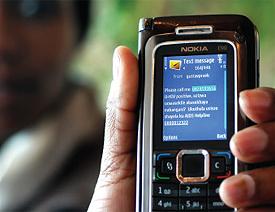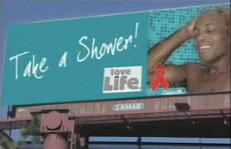
Picture: Praekelt Foundation
Around six million people are living with HIV in South Africa, and yet it still remains a taboo subject amongst the population where only one in 10 gets the treatment they need.
But Project Masiluleke (‘Lend a Helping Hand’) based in KawZulu-Natal, one of the worst affected regions, is using mobile technology to raise awareness about HIV, AIDS and TB by sending out a million text messages a day, motivating people to reach out for counseling and voluntary testing.
Accessible
It’s an idea that proved to increase calls to the National AIDS Hotline in Johannesburg three-fold during pilot schemes.
The project has been running since December last year and works by embedding health care messages alongside ‘Call-Me-Backs’, a type of free messaging used mainly by low income people in poorer communities – it even works if you don’t have any airtime left.
An estimated 80-90% of South Africans have access to a mobile phone and texts are sent in English and in Zulu making this project one of the most widely accessible and cost effective in the country.
Just digital billboards?
What sets this apart from usual top-down strategies is that it is working with iTEACH, which organised focus groups on the ground to find out what really made people go to the clinic.
 They found that billboards portray ridiculous messages that border on offensive, including advice to “take a shower” after having sex with someone potentially infected.
They found that billboards portray ridiculous messages that border on offensive, including advice to “take a shower” after having sex with someone potentially infected.
Only 5% of South Africans have tested for HIV and they only do so in the later stages. Especially amongst men, the social stigma attached to HIV means queuing for the clinic is demeaning and there is a lack of trust between clinics and patients when it comes to confidentiality. People have why-bother attitudes because media they’re usually exposed to is negative, just representing death.
Commercial value
The key to this is the private-but-not-alone approach, which has expanded to follow through the stages of awareness, referral, testing and treatment, even sending reminder texts for clinic appointments.
However, a lot of commercial value is to be gained from this scheme for and for advertising that fills any space left in texts and for the funders and techno developers, including Nokia Siemens Network, Praekelt Foundation and global innovation firm Frog Design.
There is also the danger that it might reinforce the notion that HIV is something to be ashamed of and testing should be done in secret, but it is an example of how mobile technology can positively impact health care issues in South Africa even if it does bypass the issue of dealing with (predominantly male) attitudes towards sexually transmitted infections.

Leave a comment